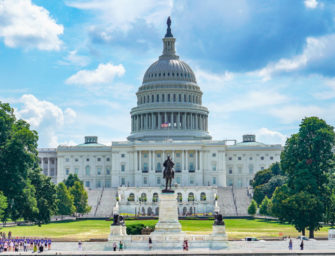Federal agency moves, vacant science positions create concerns about “brain drain” in the U.S. scientific enterprise
Recently, there have been media reports that some federal agencies—namely, the U.S. Geological Survey (USGS), the Bureau of Land Management (BLM), and parts of the U.S. Department of Agriculture (USDA)—are planning to move headquarters science staff far outside the Washington, D.C. area, causing many scientists to choose to leave these agencies rather than relocate. Meanwhile, the National Weather Service (NWS) has left hundreds of scientific positions vacant, putting stress on an already overworked staff in an agency crucial to public safety.
Even more troubling is the news that Mick Mulvaney, President Trump’s acting chief of staff and the current budget chief, highlighted last month that moving an agency outside of Washington, D.C. would encourage staff to quit, calling it “a wonderful way to sort of streamline government” and part of a larger “drain the swamp” effort. That kind of pronouncement suggests a lack of respect for scientists and for science that is harmful both to our ability to attract qualified people for public service and, ultimately, for the scientific enterprise as a whole.
The relocation decisions put unnecessary strain on government scientists who must decide whether to uproot their families, try to find a new job, or even retire early. But for those scientists who are left at agencies with large gaps in their scientific staff, these decisions upend institutional knowledge and experience, thereby leaving a vacuum of expertise within departments that are critical for the safety and economic security of the American public.
For example, the USDA decided to relocate two divisions, the Economic Research Service and the National Institute of Food and Agriculture, from the Washington, D.C. area to Kansas City within a matter of months. These divisions help to inform research and policy decisions related to ensuring our country’s agriculture, food, and natural resources are productive and environmentally sustainable. As a result of the proposed move, 250 of nearly 400 employees declined to relocate, resulting in a substantial loss of many scientific and research-based staff. While the employees’ union obtained more time for employees to make the final decision whether to move or not, the union was not positioned to address the effects that this “brain drain” is sure to have on remaining personnel.
Similar gaps could be created within the Interior Department with the relocation of several dozen USGS and 300 BLM officials away from Washington. USGS’s work includes minimizing the loss of life and property from natural disasters and managing the country’s water, biological, energy, and mineral resources.
At the same time, NWS has maintained vacancies for more than 400 staff for years, creating staff fatigue and low morale. NWS provides life-saving forecasts and warnings, as well as weather, water, and climate data that are crucial to protect people, property, and the national economy. According to a story from Government Executive, “In a report accompanying spending bills in both fiscal [years] 2018 and 2019, Congress told the National Weather Service it was ‘very concerned’ about ongoing vacancies and mandated the agency reverse course.” Nevertheless, the Trump Administration has proposed in each of its annual budget requests to slash even more NWS jobs.
It is critical that science positions at these agencies be filled or re-filled as quickly as possible to ensure that the cutting-edge scientific research continues and to demonstrate that the U.S. still respects the role of science to inform sound policy decisions. Hiring qualified individuals for these vacant science positions will assist the U.S. in driving innovation and finding solutions for the pressing issues facing our nation today, including monitoring and preparing for extreme weather events, addressing crop loss related to climate change, and informing exploration for critical minerals. However, it will likely take years—or even decades—to replace the institutional knowledge lost.
Despite these challenges, we encourage our community to consider applying for scientific positions that open at federal government agencies that provide indispensable benefits to our society. Your knowledge, research, and ability to innovate can help fill the potentially damaging gaps in our nation’s scientific enterprise. You can count on AGU’s continued, strong support and our commitment to “have your back.” We will continue our work to ensure that government scientists receive the respect their efforts deserve since they are on the front lines of protecting America’s public safety, health, and economy.




There are no comments
Add yours